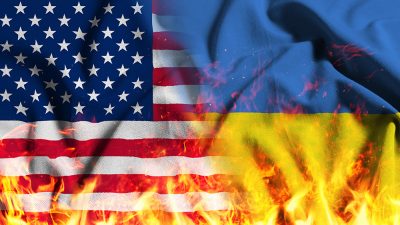Contrasting Expectations for a Russia-Ukraine Settlement

In his dramatic shift away from arming the Kiev regime, Donald Trump’s Secretary of State Marco Rubio says he’s now against funding a “stalemate” concerning the NATO proxy war against Russia. The use of the word stalemate misrepresents the actual situation in a way that serves to prolong a conflict which Trump correctly said should’ve never happened.
Since February 24, 2022, the start of Russia’s Special Miliary Operation (SMO), the Russian military has qualitatively and quantitively gotten stronger with the Kiev regime going in reverse. During this same period, Russia’s economy has fared comparably better than that of the EU. For all practical purposes, the Kiev regime doesn’t have a functioning economy.
In the US, the overall population face considerable socioeconomic challenges and is therefore reluctant to see massive aid going to Project Ukraine. This is a key motivating reason for Trump’s resounding victory over the Democratic Party establishment. A limited American military engagement abroad enables a Trump administration concentration on US domestic concerns.
In his changed position, Rubio notes that Ukraine is better off with a practical peace settlement which maintains the former Soviet republic as a functioning state. The US foreign policy establishment peace proposals are out of whack with reality.
Shortly before Trump’s decisive victory, Council on Foreign Relations President Richard Haass, gave an unrealistic commentary in Foreign Affairs. Contrary to Haass, Russia has already rejected the idea of a ceasefire for the purpose of building up Kiev regime military capability, as well as a 10-20 year wait on whether Ukraine can join NATO. As the party winning and most likely to win the NATO proxy war against it, Russia will have a great say on the settlement terms.
Haass’s selective BS (when applied to Russia) about ethically not redrawing boundaries via force is pretty rich given what NATO has done regarding Kosovo. Borders continue to be redrawn elsewhere via armed conflict. South Sudan is a recent example. In the not-too-distant past, Germany was reunified after it had been forcefully separated. Hence, it’s not so out of the ordinary for some culturally, historically, linguistically and religiously Russian territory to be reunited.
Mirroring Haass, New York former Republican Governor Geroge Pataki said on a November 12 WABC New York Talk Radio show (at the 40:24 mark) that aggression shouldn’t be rewarded. He wasn’t referring to neocon, neolib, neo-Nazi Banderite aggression. Rather, an overly selective and inaccurate overview on his part. The Hungarian-American Pataki is no Viktor Orban or Péter Szijjártó.
Among the considerably better American commentators getting some establishment play, there’s room for valid disagreement. James Webb of the Quincy Institute is the brilliant son of a former US Secretary of the Navy and Virginia Senator.
In a November 12 segment on The Duran (at the 1:00:38 mark), Webb spoke of a hypothetical geopolitical exchange involving a Russian military withdrawal from Syria. For the purpose of satisfying Western neocon and neolib feelings, there’s no need for this.
Russia’s number of military bases in the Middle East and elsewhere dwarfs that of the US. In Syria, the Russian armed presence is welcomed by the internationally recognized Syrian government unlike the current US troop deployment there. The secular Syrian government (which BTW is preferred by the majority of Syrian Christians) sought Russian, Iranian and Lebanese Hezbollah help in combating Sunni extremists affiliated with either ISIS or Al Qaeda.
Even with the Russian settlement terms, the collective Western foreign policy establishment can brag (albeit erroneously) about:
- NATO adding two new members (Finland and Sweden, thus further extending itself)
- how Putin didn’t take all of Ukraine (not that he ever actually attempted to do such).
At this time, a Russian proposed settlement is along these lines:
- strictly adhered to Ukrainian neutrality, with a limited Ukrainian armed forces
- all of Zaporozhe, Donetsk, Lugansk and Kherson going to Russia
- end of SMO related sanctions against Russia
- complete release of Russian “frozen” (stolen) assets
- protection of Russian identity (like language use) within Ukraine’s Communist drawn boundary
- discussion on a new Euro-Atlantic security arrangement.
A year ago, the Kiev regime could’ve gotten a better deal. Going back further, the Minsk Accords was an even better option for it. The longer the proxy war against Russia continues, the greater the likelihood of the Kiev regime losing more Ukrainian territory.
Don’t be fooled by the clownishly pompous likes of Sebastian Gorka. On a November 16 RT aired show (at the 15:45 mark), Gorka said that if Russia refused a Trump peace proposal, the incoming US president will flood Ukraine with arms. Like Pataki, the Brit-Hungarian-American Gorka is no Orban or Szijjártó.
Seasoned military analysts including Daniel Davis, Jacques Baud, Brian Berletic, Lawrence Wilkerson, Douglas Macgregor, Mark Sleboda and Scott Ritter, have conclusively shown how the Collective West is pretty much tapped out on what it can (within reason) militarily provide the Kiev regime, in conjunction with a dwindling number of available Kiev regime armed forces personnel.
Daniel Davis has astutely detailed why the recently reported move by the Biden administration isn’t going to change the eventual outcome.
*
Click the share button below to email/forward this article to your friends and colleagues. Follow us on Instagram and Twitter and subscribe to our Telegram Channel. Feel free to repost and share widely Global Research articles.
Don’t Miss Out on Global Research Online e-Books!
Michael Averko is a New York based independent foreign policy analyst and media critic. He is a regular contributor to Global Research.
Featured image source

